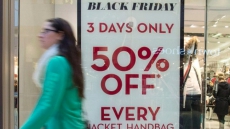TORONTO — Canada's aboriginals were far more likely to die violently than other Canadians in 2014, with aboriginal men at greater risk than women, Statistics Canada reported on Wednesday.
Aboriginals are also much more likely to be accused of violence, according to the agency.
Overall, aboriginals accounted for 23 per cent of all homicide victims last year, even though they made up only five per cent of the population.
"Aboriginal people were victims of homicide in 2014 at a rate that was about six times higher than that of non-aboriginal people," Statistics Canada said.
Experts have long blamed residential schools, poverty and lack of supports for the disproportionate rates of violence and substance abuse among Canada's aboriginal communities.
Lisa Monchalin, a criminology professor at Kwantlen Polytechnic University, said the statistics reflect the sorry history of how Canada's aboriginals have been treated.
"We had seven generations of our people put through those residential schools where we experienced violence," Monchalin said.
"All of the trauma and the impacts resulting from that are still felt in our communities."
However, last year marked the first time StatCan's homicide survey had complete police-reported data on the aboriginal identity of victims and those accused of homicide.
The data show that aboriginal males were seven times more likely to be homicide victims compared with non-aboriginal males and three times more likely than aboriginal females. The rate for aboriginal females was six times higher than for non-aboriginal women.
The data also show police had a significantly higher success rate in solving killings involving aboriginal victims — 85 per cent as opposed to 71 per cent.
Most aboriginal victims knew their killers, with aboriginal women much more likely to be killed by family members than their non-aboriginal counterparts but less likely to die at the hands of a current or former spouse or acquaintance.
The odds of an aboriginal man being killed by a spouse is nine times higher than for non-aboriginal males.
There's little difference between First Nations and other Canadians when it comes to being killed by a stranger.
When it comes to perpetrators, however, aboriginals are much more likely to be accused of homicides than their non-aboriginal counterparts.
Overall, one-third of Canadians accused last year of homicide were aboriginal — 10 times the rate for non-aboriginal accused.
The differential was especially marked for aboriginal women, who accounted for fully half of all females accused.
The agency also made police-reported data available on the aboriginal identity of female homicide victims for the years 1980 to 2013.
The proportion of homicide victims who are aboriginal women has climbed sharply in recent decades, even though the number of victims has not changed much. That's because the number of non-aboriginal women killed has been declining since 1991.
Between 1980 and 2014, police reported a total of 6,849 women killed. Female aboriginals accounted for 1,073 or 16 per cent of those.
Aboriginals accounted for one in five female homicide victims last year.
Provincially, aboriginal victims were most likely to be found in Manitoba, where the rate was nine times higher than for non-aboriginal. Newfoundland and Labrador, Prince Edward Island and New Brunswick reported no killings of aboriginals.



